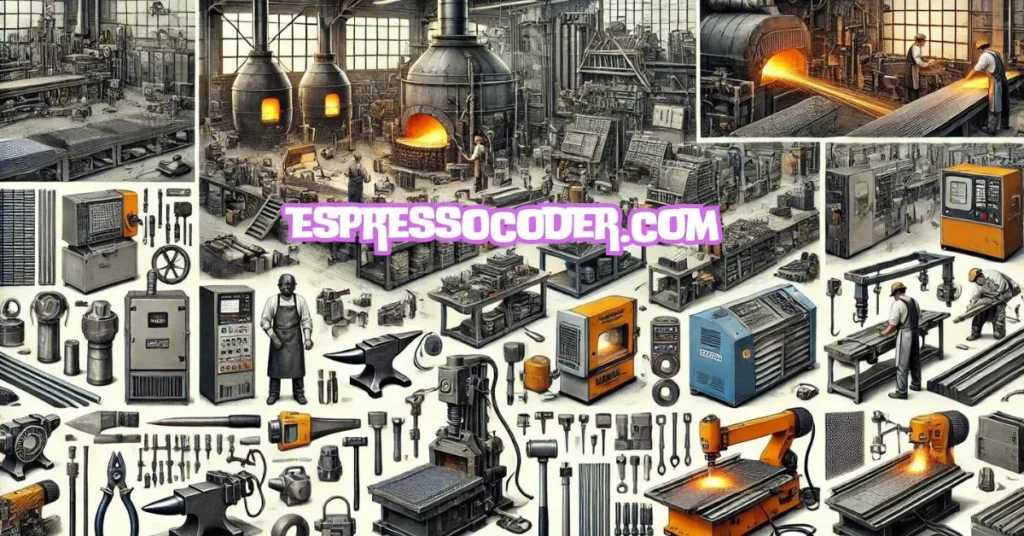Starting an ironworks business requires more than just passion for metalworking; it demands the right set of tools and machinery to turn raw metal into functional pieces. Whether you’re crafting intricate sculptures or robust industrial components, having the essential machinery ensures efficiency, precision, and the ability to scale your operations. In this comprehensive guide, we’ll explore the crucial machinery needed to kickstart your ironworks business, from foundational equipment to advanced tools that facilitate growth and productivity.
Contents
Crucial Machinery for Ironworks
1. Furnace and Forge Equipment
At the heart of any ironworks operation lies the furnace and forge equipment. These are the tools that heat and shape metal, turning raw materials into workable pieces. Depending on your preference and scale of operation, you can choose between coal-fired, propane-powered, or electric furnaces. Each type offers distinct advantages in terms of heating efficiency, cost-effectiveness, and environmental impact.
Forge equipment, including anvils and hammers, plays a pivotal role in shaping and manipulating metal. Anvils provide a sturdy surface for hammering and forming metal, while hammers come in various shapes and sizes to accommodate different tasks, from delicate shaping to heavy-duty forging.
2. Metal Cutting Tools
Precision is paramount in metalworking, making metal-cutting tools indispensable. Bandsaws, angle grinders, and plasma cutters are essential for cutting metal with accuracy and efficiency. Bandsaws are ideal for straight cuts and intricate shapes, while angle grinders offer versatility in grinding, cutting, and polishing metal surfaces. Plasma cutters use an electrically conductive gas to cut through conductive materials like steel and aluminum with remarkable speed and precision.
3. Welding Equipment
Welding is the process of joining metals using heat and sometimes pressure. It’s crucial in ironworks for assembling components, repairing structures, and creating complex designs. MIG (Metal Inert Gas) and TIG (Tungsten Inert Gas) welders are popular choices due to their versatility and ability to weld various metals effectively. MIG welding is known for its speed and ease of use, making it suitable for beginners and professionals alike. TIG welding, on the other hand, offers superior precision and control, making it ideal for intricate projects and thin materials.
4. Sheet Metal Brakes
An often-overlooked yet essential piece of equipment in ironworks is the sheet metal brakes. These machines are designed specifically for bending and shaping sheet metal with accuracy and consistency. Sheet metal brakes come in various sizes and configurations, allowing craftsmen to create precise bends and folds in metal sheets, essential for fabricating enclosures, cabinets, and other sheet metal components used in construction, automotive, and artistic applications. You can check out Onix Machinery Sales Ltd. to purchase and learn more about sheet metal brakes.
Advanced Machinery for Scaling Up
1. Hydraulic Press
Hydraulic presses are indispensable in metalworking for tasks that require immense pressure, such as forming, stamping, and punching. They use hydraulic cylinders to generate significant force, making them capable of shaping metals into complex forms and achieving uniformity in mass production settings. Hydraulic presses vary in size and tonnage capacity, catering to different industrial needs.
2. CNC Machinery
In the realm of precision and automation, CNC (Computer Numerical Control) machinery revolutionizes ironworks by offering unparalleled accuracy and repeatability. CNC machines use computer programs to control cutting tools and manipulate metal with pinpoint precision. From CNC mills and lathes to plasma cutters and routers, these machines are essential for manufacturing intricate parts, molds, and prototypes with consistency and efficiency.
3. Metal Forming Machines
Metal-forming machines such as rollers, benders, and shears play a crucial role in shaping metal into specific profiles and configurations. Rollers are used for bending and forming cylindrical and conical shapes, while benders are essential for creating curves and angles in metal bars and tubes. Shears provide precise cutting of sheet metal, allowing craftsmen to trim and shape materials accurately.
Safety Considerations and Equipment
Safety should always be a top priority in ironworks due to the inherent risks associated with working with hot metals, sharp tools, and heavy machinery. Proper safety equipment such as heat-resistant gloves, safety goggles, ear protection, and adequate ventilation systems are essential to protect workers from burns, cuts, and exposure to harmful fumes.
Budgeting and Financing Machinery
When starting an ironworks business, budgeting for machinery is a critical consideration. Factors such as equipment costs, maintenance expenses, and operational needs should be carefully assessed to determine the initial investment required. Various financing options, including equipment leasing, loans, and grants, can help alleviate upfront costs and facilitate the acquisition of necessary machinery.
Setting Up Your Ironworks Workshop
The layout and organization of your workshop play a significant role in optimizing workflow and maximizing productivity. Design considerations should include efficient placement of machinery, adequate space for material storage, and ergonomic workstations to enhance comfort and safety for workers. Investing in suitable lighting, tool storage solutions, and dust extraction systems further contributes to creating a conducive working environment.
Conclusion
Starting an ironworks business entails investing in the right machinery to meet the demands of metalworking effectively. From foundational tools like furnaces and anvils to advanced equipment such as CNC machines and hydraulic presses, each piece of machinery serves a crucial role in shaping your business’s success. By understanding the capabilities and benefits of different equipment options, you can make informed decisions that align with your business goals and operational requirements. Whether you’re crafting bespoke artworks or manufacturing industrial components, having the right machinery sets the stage for innovation, efficiency, and growth in the dynamic world of ironworks.
In summary, the journey of establishing an ironworks business begins with equipping yourself with the essential machinery, and the knowledge to forge ahead in this timeless craft.

